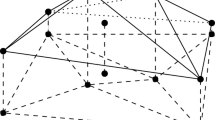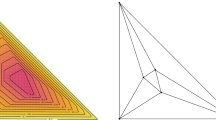Abstract
Efficient sampling, integration and optimization algorithms for logconcave functions [BV04, KV06, LV06a] rely on the good isoperimetry of these functions. We extend this to show that − 1/(n − 1)-concave functions have good isoperimetry, and moreover, using a characterization of functions based on their values along every line, we prove that this is the largest class of functions with good isoperimetry in the spectrum from concave to quasi-concave. We give an efficient sampling algorithm based on a random walk for − 1/(n − 1)-concave probability densities satisfying a smoothness criterion, which includes heavy-tailed densities such as the Cauchy density. In addition, the mixing time of this random walk for Cauchy density matches the corresponding best known bounds for logconcave densities.
Preview
Unable to display preview. Download preview PDF.
Similar content being viewed by others
References
Applegate, D., Kannan, R.: Sampling and integration of near log-concave functions. In: STOC 1991: Proceedings of the twenty-third annual ACM symposium on Theory of computing, pp. 156–163. ACM, New York (1991)
Bobkov, S.G.: Large deviations and isoperimetry over convex probability measures with heavy tails. Electronic Journal of Probability 12, 1072–1100 (2007)
Borell, C.: Convex measures on locally convex spaces. Ark. Math. 12, 239–252 (1974)
Borell, C.: Convex set functions in d-space. Periodica Mathematica Hungarica 6, 111–136 (1975)
Bertsimas, D., Vempala, S.: Solving convex programs by random walks. J. ACM 51(4), 540–556 (2004)
Dyer, M.E., Frieze, A.M.: Computing the volume of a convex body: a case where randomness provably helps. In: Proc. of AMS Symposium on Probabilistic Combinatorics and Its Applications, pp. 123–170 (1991)
Dyer, M.E., Frieze, A.M., Kannan, R.: A random polynomial-time algorithm for approximating the volume of convex bodies. J. ACM 38(1), 1–17 (1991)
Johnson, M.E.: Multivariate statistical simulation. Wiley, Chichester (1987)
Kannan, R., Li, G.: Sampling according to the multivariate normal density. In: FOCS 1996: Proceedings of the 37th Annual Symposium on Foundations of Computer Science, Washington, DC, USA, p. 204. IEEE Computer Society Press, Los Alamitos (1996)
Kannan, R., Lovász, L., Simonovits, M.: Isoperimetric problems for convex bodies and a localization lemma. J. Discr. Comput. Geom. 13, 541–559 (1995)
Kannan, R., Lovász, L., Simonovits, M.: Random walks and an O *(n 5) volume algorithm for convex bodies. Random Structures and Algorithms 11, 1–50 (1997)
Kalai, A., Vempala, S.: Simulated annealing for convex optimization. Math. Oper. Res. 31(2), 253–266 (2006)
Lovász, L.: How to compute the volume? Jber. d. Dt. Math.-Verein, Jubiläumstagung 1990, 138–151 (1990)
Lovász, L., Simonovits, M.: On the randomized complexity of volume and diameter. In: Proc. 33rd IEEE Annual Symp. on Found. of Comp. Sci., pp. 482–491 (1992)
Lovász, L., Simonovits, M.: Random walks in a convex body and an improved volume algorithm. Random Structures and Alg 4, 359–412 (1993)
Lovász, L., Vempala, S.: Fast algorithms for logconcave functions: Sampling, rounding, integration and optimization. In: FOCS 2006: Proceedings of the 47th Annual IEEE Symposium on Foundations of Computer Science, Washington, DC, USA, pp. 57–68. IEEE Computer Society Press, Los Alamitos (2006)
Lovász, L., Vempala, S.: Hit-and-run from a corner. SIAM J. Computing 35, 985–1005 (2006)
Lovász, L., Vempala, S.: Simulated annealing in convex bodies and an O *(n 4) volume algorithm. J. Comput. Syst. Sci. 72(2), 392–417 (2006)
Lovász, L., Vempala, S.: The geometry of logconcave functions and sampling algorithms. Random Struct. Algorithms 30(3), 307–358 (2007)
Author information
Authors and Affiliations
Editor information
Editors and Affiliations
Rights and permissions
Copyright information
© 2009 Springer-Verlag Berlin Heidelberg
About this paper
Cite this paper
Chandrasekaran, K., Deshpande, A., Vempala, S. (2009). Sampling s-Concave Functions: The Limit of Convexity Based Isoperimetry. In: Dinur, I., Jansen, K., Naor, J., Rolim, J. (eds) Approximation, Randomization, and Combinatorial Optimization. Algorithms and Techniques. APPROX RANDOM 2009 2009. Lecture Notes in Computer Science, vol 5687. Springer, Berlin, Heidelberg. https://doi.org/10.1007/978-3-642-03685-9_32
Download citation
DOI: https://doi.org/10.1007/978-3-642-03685-9_32
Publisher Name: Springer, Berlin, Heidelberg
Print ISBN: 978-3-642-03684-2
Online ISBN: 978-3-642-03685-9
eBook Packages: Computer ScienceComputer Science (R0)




